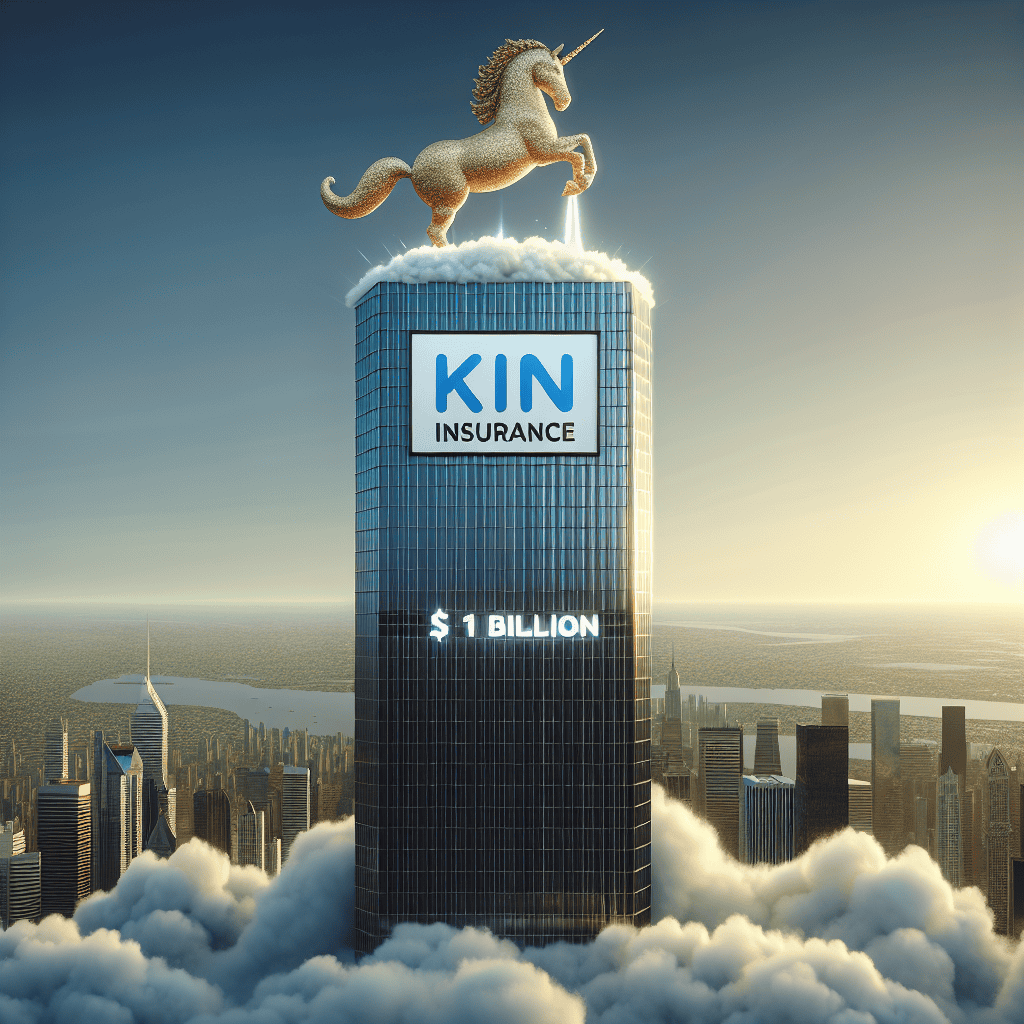“Kin Insurance: Soaring to New Heights with $1 Billion Unicorn Valuation!”
Introduction
Kin Insurance, a technology-driven home insurance company, has reached a significant milestone by achieving a $1 billion valuation, thereby earning the coveted “unicorn” status in the startup world. This achievement underscores Kin’s innovative approach to the insurance industry, leveraging data and technology to offer personalized and efficient home insurance solutions. The company’s rapid growth and successful funding rounds reflect investor confidence in its business model and potential for continued expansion. As a unicorn, Kin Insurance is poised to further disrupt the traditional insurance market, providing homeowners with more accessible and tailored insurance options.
Kin Insurance’s Journey to Unicorn Status: Key Milestones
Kin Insurance, a company that has been making waves in the insurtech industry, recently achieved a significant milestone by reaching a $1 billion valuation, thus earning the coveted unicorn status. This achievement marks a pivotal moment in the company’s journey, reflecting its innovative approach to the insurance sector and its ability to adapt to the evolving needs of homeowners. The path to this remarkable valuation has been paved with strategic decisions, technological advancements, and a keen understanding of market dynamics.
Founded in 2016, Kin Insurance set out with a mission to simplify the often complex and cumbersome process of purchasing homeowners insurance. By leveraging technology, Kin aimed to provide a more personalized and efficient experience for its customers. The company’s direct-to-consumer model eliminated the need for traditional insurance brokers, allowing for cost savings that could be passed on to policyholders. This approach not only made insurance more accessible but also more affordable, a key factor in Kin’s growing popularity.
As Kin Insurance expanded its footprint, it focused on utilizing data analytics to better assess risk and tailor policies to individual needs. This data-driven approach enabled the company to offer competitive rates while maintaining profitability. Moreover, Kin’s commitment to transparency and customer service further distinguished it from traditional insurers, fostering trust and loyalty among its clientele. These elements combined to create a strong foundation for growth, setting the stage for the company’s ascent to unicorn status.
A significant milestone in Kin’s journey was its ability to secure substantial funding from investors who recognized the potential of its innovative model. Over the years, Kin successfully completed several funding rounds, attracting investments from prominent venture capital firms. These funds were instrumental in fueling the company’s expansion into new markets and enhancing its technological capabilities. The confidence shown by investors underscored Kin’s potential to disrupt the insurance industry and solidified its position as a formidable player in the insurtech space.
In addition to financial backing, strategic partnerships played a crucial role in Kin’s rise. Collaborations with reinsurers and other industry stakeholders allowed the company to mitigate risk and scale its operations effectively. These partnerships not only provided financial stability but also enhanced Kin’s credibility in the market, further boosting its growth trajectory.
As Kin Insurance continued to innovate, it also prioritized sustainability and resilience, particularly in the face of increasing climate-related risks. By developing products that address the unique challenges posed by natural disasters, Kin demonstrated its commitment to protecting homeowners in vulnerable areas. This focus on resilience not only aligned with global trends but also resonated with consumers who are increasingly aware of the impact of climate change.
Looking ahead, Kin Insurance’s achievement of unicorn status is not merely a reflection of its past successes but also a testament to its future potential. The company’s ability to adapt to changing market conditions and its unwavering focus on customer-centric solutions position it well for continued growth. As Kin navigates the next phase of its journey, it remains poised to redefine the insurance landscape, offering innovative solutions that meet the evolving needs of homeowners.
In conclusion, Kin Insurance’s journey to achieving a $1 billion valuation is a story of innovation, strategic foresight, and a relentless pursuit of excellence. By challenging traditional norms and embracing technology, Kin has not only reached unicorn status but has also set a new standard for the insurance industry. As it continues to evolve, Kin Insurance is well-positioned to lead the charge in transforming how homeowners insurance is perceived and delivered.
The Impact of Kin Insurance’s $1 Billion Valuation on the Insurtech Industry
Kin Insurance’s recent achievement of a $1 billion valuation, thereby attaining unicorn status, marks a significant milestone not only for the company but also for the broader insurtech industry. This development underscores the growing influence and potential of technology-driven solutions in the traditionally conservative insurance sector. As Kin Insurance joins the ranks of unicorns, it highlights the increasing investor confidence in insurtech firms that are leveraging technology to disrupt and innovate within the industry.
The rise of Kin Insurance to unicorn status is emblematic of a broader trend where insurtech companies are gaining traction by addressing inefficiencies in the insurance market. By utilizing data analytics, artificial intelligence, and user-friendly digital platforms, these companies are reshaping how insurance products are developed, marketed, and delivered. Kin Insurance, in particular, has distinguished itself by focusing on providing homeowners insurance tailored to the specific needs of its customers, using technology to streamline the process and enhance customer experience. This approach not only appeals to tech-savvy consumers but also positions the company as a formidable competitor to traditional insurance providers.
Moreover, the $1 billion valuation of Kin Insurance reflects a growing recognition of the value that insurtech companies bring to the table. Investors are increasingly drawn to the potential for high returns in a sector that is ripe for disruption. The infusion of capital into Kin Insurance will likely enable the company to expand its offerings, invest in further technological advancements, and potentially enter new markets. This, in turn, could spur additional innovation and competition within the insurtech space, prompting other companies to enhance their technological capabilities and customer-centric approaches.
Furthermore, Kin Insurance’s success story serves as an inspiration for other startups in the insurtech industry. It demonstrates that with a clear vision, innovative technology, and a focus on customer needs, it is possible to achieve significant growth and attract substantial investment. This could encourage more entrepreneurs to enter the insurtech arena, fostering a dynamic ecosystem of innovation and competition. As more companies strive to emulate Kin Insurance’s success, the industry as a whole could benefit from a wave of new ideas and solutions that address longstanding challenges in the insurance market.
In addition to its impact on the insurtech industry, Kin Insurance’s unicorn status may also influence traditional insurance companies. Faced with the growing threat of technologically adept competitors, established insurers may be compelled to accelerate their digital transformation efforts. This could lead to increased collaboration between traditional insurers and insurtech firms, as well as a greater emphasis on integrating technology into existing business models. Ultimately, this could result in a more efficient and customer-friendly insurance industry, benefiting consumers and companies alike.
In conclusion, Kin Insurance’s achievement of a $1 billion valuation and unicorn status is a testament to the transformative potential of technology in the insurance sector. It highlights the growing importance of insurtech companies in driving innovation and improving customer experiences. As Kin Insurance continues to grow and evolve, its success is likely to have far-reaching implications for the insurtech industry and beyond, paving the way for a more dynamic and competitive insurance landscape.
How Kin Insurance’s Innovative Approach Led to a $1 Billion Valuation
Kin Insurance, a company that has recently achieved the coveted unicorn status with a valuation of $1 billion, stands as a testament to the power of innovation in the insurance industry. This remarkable milestone is not merely a reflection of financial success but also an indication of the transformative approach Kin Insurance has adopted in a traditionally conservative sector. By leveraging technology and focusing on customer-centric solutions, Kin Insurance has managed to carve out a significant niche in the market, setting itself apart from more established competitors.
At the core of Kin Insurance’s success is its innovative use of technology to streamline the insurance process. Unlike traditional insurance companies that rely heavily on agents and paperwork, Kin has embraced a digital-first approach. This strategy not only reduces operational costs but also enhances the customer experience by making the process of obtaining insurance more efficient and transparent. By utilizing data analytics and machine learning, Kin can offer personalized insurance policies that are tailored to the specific needs and risks of individual customers. This level of customization is a significant departure from the one-size-fits-all policies that have long dominated the industry.
Furthermore, Kin Insurance has strategically focused on underserved markets, particularly in regions prone to natural disasters. By offering specialized coverage options for homeowners in these high-risk areas, Kin has tapped into a segment of the market that has often been overlooked by larger insurers. This focus not only addresses a critical need but also positions Kin as a socially responsible company that is committed to providing solutions for those who need them most. The company’s ability to assess risk accurately and price policies competitively has been instrumental in its rapid growth and success.
In addition to its technological prowess and market focus, Kin Insurance’s commitment to customer service has played a crucial role in its ascent to unicorn status. The company has invested heavily in building a robust customer support system that is accessible and responsive. By prioritizing customer satisfaction and engagement, Kin has fostered a loyal customer base that is more likely to renew policies and recommend the company to others. This emphasis on customer relationships is a key differentiator in an industry where customer service is often seen as an afterthought.
Moreover, Kin Insurance’s innovative approach extends to its business model, which is designed to be agile and adaptable. The company operates with a lean structure that allows it to respond quickly to changes in the market and regulatory environment. This flexibility has enabled Kin to scale rapidly and efficiently, seizing opportunities as they arise and mitigating potential challenges before they become significant obstacles. The ability to pivot and adapt is particularly valuable in the fast-evolving landscape of the insurance industry, where new risks and technologies are constantly emerging.
In conclusion, Kin Insurance’s achievement of a $1 billion valuation and unicorn status is a direct result of its innovative approach to the insurance business. By harnessing technology, focusing on underserved markets, prioritizing customer service, and maintaining an agile business model, Kin has positioned itself as a leader in the industry. As the company continues to grow and evolve, it serves as an inspiring example of how innovation and a customer-centric mindset can drive success in even the most traditional sectors.
The Role of Technology in Kin Insurance’s Rise to Unicorn Status

Kin Insurance’s recent achievement of a $1 billion valuation, thus reaching unicorn status, marks a significant milestone in the insurance industry, particularly for a company that has embraced technology as a core component of its business model. This accomplishment underscores the transformative power of technology in reshaping traditional sectors, and Kin Insurance serves as a prime example of how innovative approaches can lead to substantial growth and success.
At the heart of Kin Insurance’s rise is its commitment to leveraging technology to enhance customer experience and streamline operations. Unlike traditional insurance companies that often rely on cumbersome processes and outdated systems, Kin has adopted a digital-first approach. This strategy not only simplifies the insurance purchasing process but also makes it more accessible and efficient for consumers. By utilizing advanced algorithms and data analytics, Kin can offer personalized insurance policies that are tailored to the specific needs and risks of individual customers. This level of customization is a significant departure from the one-size-fits-all policies that have long dominated the industry.
Moreover, Kin Insurance’s use of technology extends beyond just policy customization. The company has also invested in developing a robust digital platform that facilitates seamless interactions between customers and the company. This platform allows for easy policy management, claims processing, and customer support, all of which can be accessed through a user-friendly interface. By prioritizing digital solutions, Kin has been able to reduce overhead costs and pass those savings on to customers in the form of competitive pricing. This cost-effectiveness, combined with superior service, has been instrumental in attracting a growing customer base and driving the company’s rapid expansion.
In addition to enhancing customer experience, technology has played a crucial role in Kin Insurance’s ability to assess and manage risk more effectively. The company employs sophisticated data analytics tools to evaluate a wide range of risk factors, from weather patterns to property characteristics. This data-driven approach enables Kin to make more informed underwriting decisions, thereby reducing the likelihood of losses and improving overall financial performance. Furthermore, by continuously analyzing data, Kin can quickly adapt to changing market conditions and emerging risks, ensuring that its offerings remain relevant and competitive.
The integration of technology into Kin Insurance’s operations has also facilitated strategic partnerships and collaborations that have further fueled its growth. By aligning with tech-savvy partners, Kin has been able to expand its reach and enhance its service offerings. These partnerships have provided access to additional resources and expertise, enabling the company to innovate and scale more rapidly than it could have on its own. As a result, Kin has been able to enter new markets and diversify its product portfolio, contributing to its impressive valuation and unicorn status.
In conclusion, Kin Insurance’s ascent to a $1 billion valuation and its recognition as a unicorn company highlight the pivotal role that technology plays in modernizing the insurance industry. By embracing digital solutions and data-driven strategies, Kin has not only improved its operational efficiency and customer satisfaction but also positioned itself as a leader in the insurtech space. As the company continues to innovate and expand, it serves as a testament to the potential of technology to drive growth and success in even the most traditional of industries.
What Kin Insurance’s Unicorn Status Means for Homeowners Insurance
Kin Insurance, a technology-driven home insurance company, has recently achieved a significant milestone by reaching a $1 billion valuation, thus earning the coveted unicorn status. This development marks a pivotal moment not only for the company itself but also for the broader homeowners insurance industry. As Kin Insurance continues to innovate and expand, its newfound status as a unicorn could have far-reaching implications for homeowners and the insurance market as a whole.
To begin with, Kin Insurance’s rise to unicorn status underscores the growing importance of technology in the insurance sector. Traditional insurance companies have long been criticized for their cumbersome processes and lack of transparency. In contrast, Kin Insurance leverages cutting-edge technology to streamline the insurance experience, offering homeowners a more efficient and user-friendly way to obtain coverage. By utilizing data analytics and machine learning, Kin can provide personalized insurance solutions that are tailored to the specific needs of each homeowner. This approach not only enhances customer satisfaction but also allows for more accurate risk assessment, potentially leading to more competitive pricing.
Moreover, Kin Insurance’s success highlights a broader trend towards digital transformation within the insurance industry. As consumers increasingly demand convenience and accessibility, insurance companies are being compelled to adapt by embracing digital platforms. Kin’s innovative model, which eliminates the need for traditional agents and brokers, serves as a testament to the potential of digital-first strategies. This shift towards digitalization is likely to encourage other insurers to invest in technology, ultimately benefiting homeowners by providing them with more options and improved services.
In addition to driving technological advancements, Kin Insurance’s unicorn status may also influence the competitive landscape of the homeowners insurance market. As a well-capitalized company, Kin is now better positioned to expand its market share and challenge established players. This increased competition could lead to more favorable terms for homeowners, as insurers strive to differentiate themselves through better pricing, enhanced coverage options, and superior customer service. Furthermore, Kin’s success may inspire new entrants to the market, fostering a more dynamic and competitive environment that ultimately benefits consumers.
Another important aspect to consider is the potential impact of Kin Insurance’s valuation on investor confidence in the insurtech sector. The company’s achievement serves as a validation of the insurtech model, which combines technology and insurance to create innovative solutions. As a result, investors may be more inclined to support other insurtech startups, leading to increased funding and accelerated growth within the sector. This influx of capital could drive further innovation, resulting in new products and services that cater to the evolving needs of homeowners.
Finally, Kin Insurance’s unicorn status may also have implications for regulatory frameworks governing the insurance industry. As technology continues to reshape the sector, regulators will need to adapt to ensure that consumer protections are maintained while fostering innovation. Kin’s success could prompt regulators to reevaluate existing policies and consider new approaches that accommodate the unique challenges and opportunities presented by insurtech companies.
In conclusion, Kin Insurance’s achievement of unicorn status represents a significant milestone with potential implications for the homeowners insurance industry. By driving technological advancements, increasing competition, boosting investor confidence, and influencing regulatory frameworks, Kin’s success could pave the way for a more efficient, customer-centric, and innovative insurance market. As the company continues to grow and evolve, homeowners stand to benefit from the positive changes it brings to the industry.
Kin Insurance’s Growth Strategy: Lessons for Aspiring Startups
Kin Insurance’s recent achievement of a $1 billion valuation, thereby attaining unicorn status, serves as a compelling case study for aspiring startups aiming to navigate the competitive landscape of the insurance industry. This milestone is not merely a reflection of financial success but also a testament to the strategic decisions and innovative approaches that have propelled Kin Insurance to the forefront of the market. By examining the company’s growth strategy, emerging entrepreneurs can glean valuable insights into the elements that contribute to sustainable business development.
One of the key factors underpinning Kin Insurance’s success is its customer-centric approach. From its inception, the company has prioritized understanding and addressing the unique needs of its clientele. By leveraging advanced data analytics and technology, Kin Insurance has been able to offer personalized insurance solutions that resonate with modern consumers. This focus on customization not only enhances customer satisfaction but also fosters loyalty, a critical component for long-term success in any industry. Aspiring startups can learn from this by emphasizing the importance of tailoring their products and services to meet the specific demands of their target audience.
In addition to its customer-focused strategy, Kin Insurance has demonstrated a keen ability to adapt to changing market conditions. The insurance industry is notoriously complex and heavily regulated, yet Kin has managed to navigate these challenges with agility and foresight. By staying attuned to regulatory shifts and emerging trends, the company has been able to pivot its strategies effectively, ensuring continued growth and relevance. This adaptability is a crucial lesson for startups, highlighting the need for flexibility and responsiveness in an ever-evolving business environment.
Moreover, Kin Insurance’s innovative use of technology has been instrumental in its rise to unicorn status. The company has harnessed the power of digital platforms to streamline operations, reduce costs, and enhance the customer experience. By integrating cutting-edge technologies such as artificial intelligence and machine learning, Kin has been able to optimize its underwriting processes and improve risk assessment accuracy. This technological prowess not only sets Kin apart from traditional insurers but also underscores the importance of embracing innovation as a driver of growth. Startups should take note of the potential that technology holds in transforming business models and creating competitive advantages.
Furthermore, Kin Insurance’s strategic partnerships have played a significant role in its expansion. By collaborating with key players in the industry, the company has been able to extend its reach and access new markets. These alliances have provided Kin with valuable resources and expertise, enabling it to scale efficiently and effectively. For startups, this underscores the value of building strong networks and seeking out partnerships that can facilitate growth and development.
Finally, Kin Insurance’s commitment to sustainability and social responsibility has resonated with consumers and investors alike. In an era where corporate values are increasingly scrutinized, Kin’s dedication to ethical practices and community engagement has bolstered its reputation and appeal. This aspect of Kin’s strategy serves as a reminder to startups of the importance of aligning business objectives with broader societal goals.
In conclusion, Kin Insurance’s journey to achieving unicorn status offers a wealth of lessons for aspiring startups. By focusing on customer needs, embracing adaptability, leveraging technology, forging strategic partnerships, and committing to social responsibility, Kin has set a benchmark for success in the insurance industry. As startups chart their own paths to growth, these insights can serve as guiding principles for building resilient and innovative enterprises.
The Future of Insurtech: Insights from Kin Insurance’s Success Story
Kin Insurance, a prominent player in the insurtech sector, has recently achieved a significant milestone by reaching a $1 billion valuation, thereby earning the coveted unicorn status. This achievement not only underscores the company’s rapid growth and innovative approach but also highlights the transformative potential of technology in the insurance industry. As we delve into the factors contributing to Kin Insurance’s success, it becomes evident that the future of insurtech is poised for remarkable advancements.
To begin with, Kin Insurance’s ascent can be attributed to its customer-centric model, which leverages technology to streamline the insurance process. By focusing on homeowners’ insurance, Kin has carved out a niche in a market that has traditionally been dominated by legacy insurers. The company’s use of data analytics and artificial intelligence allows it to offer personalized policies that cater to the specific needs of its clients. This tailored approach not only enhances customer satisfaction but also reduces the risk of underinsurance, a common issue in the industry.
Moreover, Kin Insurance’s digital-first strategy has been instrumental in its success. In an era where consumers increasingly demand convenience and efficiency, Kin’s online platform provides a seamless user experience. Prospective policyholders can obtain quotes, customize coverage, and manage claims entirely online, eliminating the need for cumbersome paperwork and lengthy phone calls. This digital transformation is a testament to the company’s commitment to innovation and its ability to adapt to changing consumer preferences.
In addition to its technological prowess, Kin Insurance has demonstrated a keen understanding of the importance of financial stability. The company’s recent funding rounds, which have propelled it to unicorn status, reflect investor confidence in its business model and growth prospects. By securing substantial capital, Kin is well-positioned to expand its offerings and enter new markets, further solidifying its position as a leader in the insurtech space.
Furthermore, Kin Insurance’s success story offers valuable insights into the broader trends shaping the future of insurtech. As the industry continues to evolve, companies that prioritize technology and customer experience are likely to thrive. The integration of advanced technologies such as machine learning and blockchain is expected to revolutionize risk assessment, claims processing, and fraud detection, ultimately leading to more efficient and transparent insurance solutions.
Additionally, the rise of insurtech companies like Kin underscores the growing importance of collaboration between traditional insurers and tech-driven startups. By partnering with insurtech firms, established insurers can leverage cutting-edge technologies to enhance their offerings and remain competitive in an increasingly digital landscape. This symbiotic relationship is poised to drive innovation and reshape the insurance industry as a whole.
In conclusion, Kin Insurance’s achievement of unicorn status serves as a compelling example of the transformative power of technology in the insurance sector. By embracing a customer-centric approach, leveraging digital platforms, and securing financial stability, Kin has positioned itself as a trailblazer in the insurtech space. As the industry continues to evolve, the success of companies like Kin offers a glimpse into the future of insurance, where technology and innovation will play a pivotal role in meeting the needs of modern consumers.
Q&A
1. **What is Kin Insurance?**
Kin Insurance is a direct-to-consumer home insurance company that uses technology to simplify the insurance process and offer personalized coverage.
2. **What milestone did Kin Insurance recently achieve?**
Kin Insurance recently reached a $1 billion valuation, achieving unicorn status.
3. **What does achieving unicorn status mean?**
Achieving unicorn status means that a privately held startup company has reached a valuation of $1 billion or more.
4. **How did Kin Insurance reach this valuation?**
Kin Insurance reached this valuation through successful funding rounds and growth in its customer base and market presence.
5. **What is unique about Kin Insurance’s approach?**
Kin Insurance uses data and technology to offer customized insurance policies directly to consumers, bypassing traditional insurance brokers.
6. **What markets does Kin Insurance primarily serve?**
Kin Insurance primarily serves homeowners in disaster-prone areas, offering coverage tailored to their specific risks.
7. **What are the future plans for Kin Insurance following this valuation?**
Following this valuation, Kin Insurance plans to expand its market reach, enhance its technology platform, and continue innovating in the home insurance sector.
Conclusion
Kin Insurance, a direct-to-consumer home insurance company, has reached a significant milestone by achieving a $1 billion valuation, thereby attaining unicorn status. This achievement underscores the company’s rapid growth and its innovative approach to the insurance industry, leveraging technology to streamline processes and enhance customer experience. The valuation reflects investor confidence in Kin Insurance’s business model and its potential for continued expansion in the competitive insurtech market. As a unicorn, Kin Insurance is well-positioned to further disrupt traditional insurance practices and capitalize on emerging opportunities in the sector.





